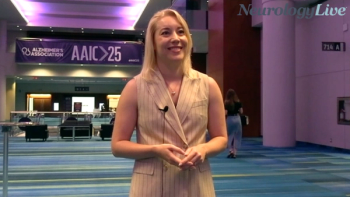
Data presented at AAIC 2025 from a phase 2 study suggest that ABvac40 may slow cognitive decline in patients with Alzheimer disease, particularly among those who developed higher antibody levels.

Data presented at AAIC 2025 from a phase 2 study suggest that ABvac40 may slow cognitive decline in patients with Alzheimer disease, particularly among those who developed higher antibody levels.

UCB's bepranemab shows promise in slowing tau accumulation in early Alzheimer disease, marking an advancement in tau-targeted therapies.

The Emeritus Professor of Cognitive Neurology at VU University Medical Center talked about findings presented at AAIC 2025 from the phase 3 BROADWAY trial of obicetrapib in Alzheimer disease. [WATCH TIME: 3 minutes]

A groundbreaking phase 2 study evaluates PRI-002's potential to treat mild Alzheimer symptoms, aiming for significant safety and efficacy insights by 2026.

Valiltramiprosate shows promising effects on brain structure and cognitive function in early Alzheimer disease, highlighting its potential for MCI treatment.

The chief development officer at Spinogenix shared initial results from the first cohort of the company’s phase 2 trial assessing SPG302 in Alzheimer disease presented at AAIC 2025. [WATCH TIME: 6 minutes]

New phase 2 data reveals AR1001's potential as a cognitive enhancer and disease-modifying therapy for mild to moderate Alzheimer's disease.

New data reveals lecanemab's long-term benefits for early Alzheimer's patients, showcasing improved cognitive outcomes and promising safety profiles over four years.

New findings reveal racial disparities in Alzheimer’s trial eligibility, highlighting higher screen failure rates among Black participants in the Auτonomy study.

The senior data scientist at Linus Health discussed how acoustic and speech-based metrics can be used to capture subtle cognitive signals during neuropsychological assessments. [WATCH TIME: 6 minutes]

AAV2-BDNF gene therapy shows promise in reversing cognitive decline in early Alzheimer's, enhancing neuronal function and safety in initial trials.

The chief scientific officer at Neurogen Biomarking outlined a novel home-based diagnostic model that can accelerate detection of early AD through biomarker profiling. [WATCH TIME: 5 minutes]

The associate professor in the Department of Psychiatry at McGill University discussed the strengths and limitations of PET and blood biomarkers in identifying early Alzheimer disease.

Phase 2 VIVA-MIND study shows varoglutamstat is safe for early Alzheimer’s patients but fails to improve cognitive outcomes.

A new analysis revealed structural brain differences among patients with breast cancer who experienced chemotherapy-associated cognitive impairment following anthracycline-taxane treatment.

New research reveals nicotinamide riboside supplementation enhances hippocampal perfusion in adults with mild cognitive impairment, but memory performance remains unchanged.

The associate professor of neurology at Icahn School of Medicine at Mount Sinai discussed the clinical and scientific advantages of blood-based biomarkers over imaging for Alzheimer disease. [WATCH TIME: 5 minutes]

At AAIC 2025, the chief medical officer at CND Life Sciences discussed recent progress in detecting neurodegenerative diseases earlier using tools like the Syn-One Test. [WATCH TIME: 3 minutes]

Although the FDA-approved therapies lecanemab and donanemab both slow progression in early Alzheimer disease, a new study presented at AAIC 2025 highlighted differences in their safety profiles.

New research revealed that structured lifestyle programs could significantly enhance cognitive function in older adults at risk of decline, outperforming self-guided interventions.

In a new study presented at AAIC 2025, findings showed that walking significantly slowed cognitive decline in APOE ε4 carriers, especially among Black and White women.

A new study presented at AAIC 2025 suggested that combination therapy with cardiovascular medications was associated with slower cognitive decline in older adults.

The disease area stronghold leader in neurodegeneration at Johnson & Johnson discussed data presented at AAIC 2024 highlighting different subtypes of Alzheimer disease that may lead to more personalized treatments. [WATCH TIME: 4 minutes]

The disease area stronghold leader in neurodegeneration at Johnson & Johnson provided insight on the importance of the Global Neurodegeneration Proteomics Consortium, illustrated in several presentations at the recently concluded AAIC 2024. [WATCH TIME: 7 minutes]

A group of clinician researchers at NYU Langone provided insight on a study presented at AAIC 2024 looking at the correlations between quantitative gait measures and Alzheimer disease biomarkers. [WATCH TIME: 4 minutes]

The medical director of the Toronto Memory Program at the University of Toronto provided an in-depth overview of results from an ongoing phase 1 study assessing mivelsiran as a treatment for patients with early-stage Alzheimer disease. [WATCH TIME: 8 minutes]

Neurology News Network. for the week ending August 31, 2024. [WATCH TIME: 4 minutes]

The chairman and chief executive officer at Biomed discussed the additive benefits of combination therapy for Alzheimer disease, providing context on the strengths of different drugs and how it might lead to a more precision medicine approach. [WATCH TIME: 6 minutes]

Steve Herne, chief commercial officer at Unlearn, provided context on a recently conducted study assessing the company’s digital twin methodology AI tool to enhance the statistical certainty of Alzheimer trials.

Mind Moments®, a podcast from NeurologyLive®, brings you an exclusive interview with Sharon Cohen, MD. [LISTEN TIME: 20 minutes]